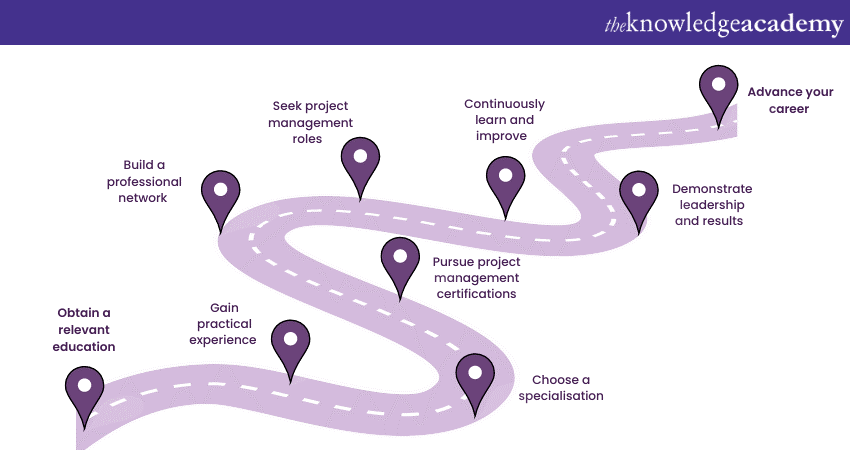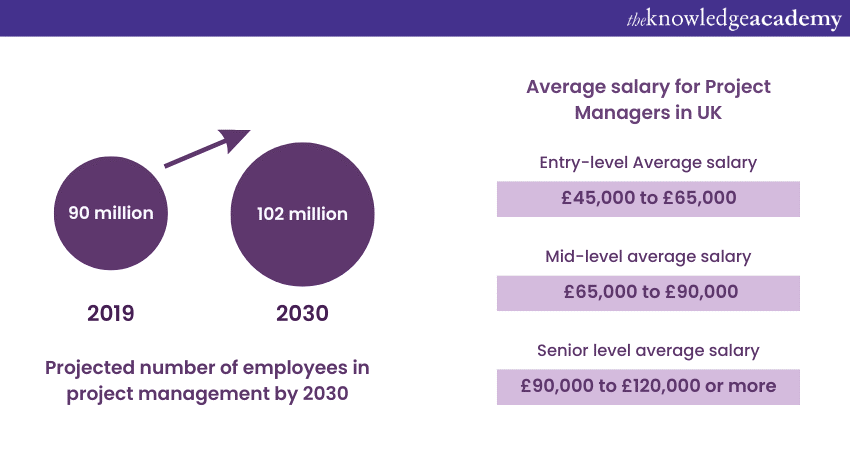We may not have the course you’re looking for. If you enquire or give us a call on 01344203999 and speak to our training experts, we may still be able to help with your training requirements.
Training Outcomes Within Your Budget!
We ensure quality, budget-alignment, and timely delivery by our expert instructors.

One of the exciting and rewarding careers in the Project Management domain is that of a Project Manager. It best suits people who enjoy leading teams, organising tasks, and delivering successful outcomes. If you are wondering How to Become a Project Manager, you have come to the right blog.
Project Managers play a crucial role in various industries and ensure timely project completion within the allocated budget and quality parameters. They are also highly sought after because of their specialised skills. According to Statista, 47% of companies employ multiple Project Managers, and 35% employ only one. This shows that companies are realising their need to manage projects better. This comprehensive blog will help you understand How to Become a Project Manager and learn about their roles, qualifications, skills, & salary.
Table of Contents
1) What is the role of a Project Manager?
2) Skills and qualifications of a Project Manager
3) How to become a Project Manager: A roadmap
4) Job scope and salary of Project Manager
5) Conclusion
What is the role of a Project Manager?
A Project Manager's main responsibility is ensuring smooth planning, execution, and timely completion of projects within an organisation. They act as the bridge between the project team and stakeholders, ensuring effective and two-way communication and alignment of goals. Some key responsibilities of a Project Manager include the following:
a) Project planning: Creating a comprehensive project plan, defining objectives, scope, and deliverables.
b) Resource management: Assigning tasks, allocating resources, and managing project budgets.
c) Risk assessment and mitigation: Identifying potential risks and developing strategies to minimise their impact.
d) Team leadership: Motivating and guiding team members, fostering collaboration, and resolving conflicts.
e) Monitoring and control: Tracking project progress, managing changes, and ensuring adherence to timelines.
f) Stakeholder management: Engaging with stakeholders, providing updates, and managing expectations.

Skills and qualifications of a Project Manager
Becoming a successful Project Manager requires technical expertise, soft skills, and industry knowledge. Here are some essential skills you need to have.
a) Maintaining clear and effective communication
b) The ability to inspire, motivate, and guide teams towards project success
c) Efficiently prioritise tasks, allocate resources, and meet project deadlines
d) Problem-solving and decision-making
e) Familiarity with methodologies like Agile or Waterfall for structured project execution
f) Domain-specific knowledge relevant to the projects being managed
Qualifications for Project Manager
In addition to these skills, certain qualifications can bolster your Project Management career prospects. While not all organisations require formal certifications, they can help demonstrate your commitment to the profession.
a) Project Management certifications: Certifications such as Project Management Professional (PMP) or Certified Associate in Project Management (CAPM) validate your knowledge and skills in project management methodologies and best practices. These certifications are globally recognised and can enhance your career prospects.
b) Relevant educational background: While Project Management roles do not always require specific degrees, a bachelor's or master's degree in fields like business administration, engineering, or computer science can help you understand its principles, techniques and the technical knowledge of the domain.
Remember, while skills and qualifications are essential, practical experience and successful project deliveries are highly valued by employers. If you are new to the domain, seek opportunities to gain hands-on experience through internships, volunteering, or taking on project management roles within your current organisation.
Become familiar with the project management structure, its planning and get certified as a Project Manager with the Certified Global Project Manager (CGPM) training.
How to become a Project Manager: A roadmap

Becoming a Project Manager involves a combination of education, practical experience, professional development, and career progression. Here is a roadmap you can follow to embark on a successful career.
Obtain a relevant education
While not always a strict requirement, obtaining a bachelor's or master's degree in business administration, engineering, or IT can provide a solid foundation in project management principles.
You can also opt for a program that reflects the domain you want to work in as a Project Manager. For example, if you want to work in IT, getting a bachelor's or master's degree in IT can help you hone your technical skills, boosting your credibility as a Project Manager.
Gain practical experience
Practical Project Management Experience is crucial to understanding project dynamics and developing essential skills. Seek opportunities to work on projects within your current organisation or explore internships and volunteering opportunities. These experiences will expose you to real-world project scenarios, team dynamics, and challenges, enabling you to learn and grow professionally.
Choose a specialisation
As you progress in your Project Management career, you may find it beneficial to choose a specialisation that aligns with your interests, skills, and industry demands. Specialising in a specific area of Project Management can enhance your expertise and open up new opportunities. Here are some popular specialisations related to the field that you can consider:
a) IT Project Management: Oversee technology-related projects and software development.
b) Construction Project Management: Manage construction projects and ensure timely completion.
c) Healthcare Project Management: Coordinate projects in the healthcare sector, ensuring compliance and efficient delivery.
d) Event Management: Organise and execute successful events, such as conferences and festivals.
e) Agile Project Management: Implement Agile methodologies for iterative and collaborative project execution.
f) Environmental Project Management: Focus on environmental conservation, sustainability, and compliance.
Choose a specialisation based on your interests, industry trends, and market demand for specific Project Management skills. You must also remember that core skills are transferable, allowing for versatility and potential diversification in the future.
Learn how to use Waterfall Project Management technique and become a better Project Manager with the Waterfall Project Management Certification Course.
Pursue project management certifications
Consider pursuing Project Management Certifications such as the Project Management Professional (PMP) or Certified Associate in Project Management (CAPM). These globally recognised certificates demonstrate your knowledge, skills, and commitment to Project Management. They validate your ability to apply best practices, methodologies, and techniques in managing projects effectively.
Build a professional network
Networking is essential for career growth in Project Management. Attend industry events, join project management associations, and connect with professionals in the field. Building a strong professional network can provide valuable insights, mentorship opportunities, and potential job leads. Engage in discussions, share experiences, and learn from seasoned Project Managers who can offer guidance and support.
Seek project management roles
Look for entry-level Project Management positions or roles that offer project coordination or assistant responsibilities. These positions allow you to gain practical experience and exposure to the Project Management processes. Working alongside experienced Project Managers will teach you about project planning, resource allocation, risk management, and stakeholder communication.
Continuously learn and improve
Project Management is a field that constantly evolves. You should know its latest methodologies, tools, and trends. You must attend workshops, webinars, and training sessions to enhance your knowledge and skills. Seeking professional development opportunities, such as online courses or specialised certifications, to expand your expertise in specific areas of project management can also be helpful.
Join our Certified Digital Services Project Manager (CDSPM) course and unlock new opportunities for growth and advancement.
Demonstrate leadership and results
Actively seek opportunities to demonstrate your leadership abilities. Take initiatives, drive projects forward, and effectively communicate with team members and stakeholders. Showcase your ability to deliver successful projects within budget, on time, and with the desired outcomes. Highlight your achievements and your positive impact on projects, as this will establish you as a competent and results-oriented Project Manager.
Advance your career
As you gain experience and expertise, aim for roles with increasing responsibilities and larger-scale projects. Consider specialising in specific industries or project types to expand your knowledge and career options. Pursue opportunities for professional growth, such as senior Project Manager positions, Project Management consultancy, or even leadership roles within Project Management Offices (PMOs).
Remember, the path to becoming a Project Manager may vary based on your background, industry, and personal aspirations. Continually seek growth opportunities, embrace challenges, and adapt to the evolving Project Management landscape. You can forge a successful and fulfilling career as a Project Manager by continuously learning, improving your skills, and demonstrating your capabilities.
Take your first step towards becoming a Project Manager with our comprehensive Introduction To Project Management Certification Course.
Job scope and salary of Project Manager
There is a massive demand for Project Managers, and as businesses strive for efficiency, productivity, and successful project delivery, the demand for skilled professionals will continue to increase. According to Talent Gap Report by PMI, currently, there are 90 million Project Management oriented jobs, and it is expected to grow to 102 million jobs by 2030. There is a huge demand for jobs in Project Management across different domains and industries.

Organisations seek professionals who can effectively lead and manage projects, from technology and construction to healthcare and finance. The job opportunities for Project Managers span across sectors, providing a diverse range of options for career growth.
Manufacturing and construction is the leading sector giving the most Project Management jobs, and is projected to grow. Information and publishing is another leading sector where many Project Management oriented jobs are available. Some other industries with ample jobs are finance, insurance, oil & gas and management.
Progression in Project Management
Project Management offers ample opportunities for career progression. Starting as a Project Coordinator or Assistant, you can advance to roles such as Project Manager, Senior Project Manager, Program Manager, or PMO Director.
As you gain experience, skills, and expertise, you can take on larger and more complex projects, manage multiple teams, or specialise in specific domains. Project Management Certifications, advanced degrees, and continuous professional development can further enhance your career progression.
Salary trends
The Project Manager is an expansive job role, and the salary is based on multiple factors such as industry, experience, location, and organisational size. The salary offered to Project Managers is competitive with significant growth potential.
Entry-level Project Managers or those with limited experience may earn an average salary of around £45,000 to £65,000 annually. As experience and responsibilities increase, mid-level professionals can earn between £65,000 and £95,000 annually.
Senior professionals, or those in leadership roles such as Program Managers or Directors, can command higher salaries ranging from £95,000 to £115,000 or more, depending on their expertise and the complexity of their projects. It's important to note that these figures are estimates and can vary based on factors specific to each individual and the job market conditions.
Join our Project Management Office Fundamentals Certification Course to learn the various PMO components.
Conclusion
We hope you enjoyed reading this informative blog on How to Become a Project Manager. Constant learning and updating knowledge is essential to work in this position and enhance your career. With strong leadership, communication, and organisational skills, Project Managers oversee projects and lead teams towards success. By following the steps outlined in this guide, including education, practical experience, certifications, and specialisation, you can build a successful career in Project Management.
Join our Project Management Black Belt course to understand a Project Manager's fundamental roles and responsibilities.
Frequently Asked Questions
Upcoming Project Management Resources Batches & Dates
Date
 Introduction to Project Management Course
Introduction to Project Management Course
Fri 10th Jan 2025
Fri 14th Mar 2025
Fri 9th May 2025
Fri 15th Aug 2025
Fri 10th Oct 2025
Fri 12th Dec 2025







 Top Rated Course
Top Rated Course


 If you wish to make any changes to your course, please
If you wish to make any changes to your course, please


